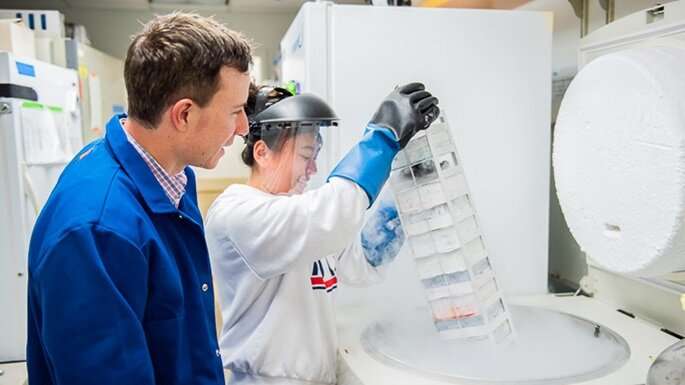Gene discovery solves 51-year-old mystery cause of inherited pancreatitis

What began as a 51-year-old mystery comes down to a single gene, as researchers from the University of Chicago and University of California, San Francisco discovered the cause of a new inherited form of pancreatitis.
Pancreatitis is a disease that causes the pancreas to become inflamed, triggering severe abdominal pain. Long-term pancreatitis can cause the organ to stop functioning altogether, leading to diabetes, and in many cases, pancreatic cancer. It is most often caused by alcohol abuse, but several forms are caused by genetic mutations.
In 2012, Mark Anderson, who earned his MD and Ph.D. at UChicago and is now an endocrinologist at UCSF, saw a patient in his clinic with diabetes and pancreatitis. She explained that it ran in her family—in fact, they had been written up in a study for the Annals of Internal Medicine in 1968. Doctors at UCSF had documented 71 members of the family, then living in a farming community around Northern California. Of the 18 people they examined, six were officially diagnosed with pancreatitis and another five were suspected of having the disease. The particular form of pancreatitis affecting this family was especially severe and struck at a young age; children suffering from it were said to come inside from the fields and collapse onto the floor in pain.
At the time, the researchers suspected that it was an autosomal dominant form of the disease, meaning that it could be inherited through one mutated gene. There was no way of proving this back then—before the advent of genetic sequencing—so the case was closed.
After Anderson and his colleagues realized the implications of their current patient's connections to that story, they ordered genetic tests for her and several of her family members. Working together with Scott Oakes, MD, a former UCSF pathologist and cell biologist now on the faculty at UChicago, they screened the family for the five known genetic mutations that can cause inherited pancreatitis. None of them matched, but a new mutation in a gene that produces a digestive enzyme called elastase 3B emerged as a possible culprit.
In the lab, the researchers expressed both the normal and mutated forms of the elastase 3B gene, and used CRISPR gene-editing technology to engineer mice that had the mutation. They saw that the mutated form of the gene causes the pancreas to secrete too much of the enzyme, which damages the pancreas as it begins to digest itself. After 51 years, they had an answer for what was causing the unfortunate family's misery.
"The tools to do genetic sleuthing now are just unbelievable," Anderson said. "What an exciting time to be a clinician and a scientist. You really can take things from the bedside to the bench and back this quickly."
'Medical archaeology'
The discovery was published in September in the Journal of Clinical Investigation. Oakes, who calls it a work of "medical archaeology," says it's also an opportunity to find new treatments for inherited forms of pancreatitis, a notoriously difficult disease to treat. Short of removing the pancreas—which has the equally problematic side effect of making the patient diabetic—or performing a pancreas or islet cell transplant, doctors can mostly just help patients manage their pain and symptoms.
"There are a lot of patients who still have what looks like inherited pancreatitis that don't have a genetic diagnosis—maybe some of these have mutations in elastase 3B," Oakes said. "So, it has immediate implications not only for this family but potentially other families that have pancreatitis."
Understanding how this mutation works could lead to solutions for more patients as well, Oakes said. New drugs could target the elastase 3B gene with an antibody or molecule that counteracts the extra enzymes.
"The presentation is so dramatic it's possible that elastase 3B might be a good place to intervene in regular, garden-variety pancreatitis," he said. "If you could tamp it down, maybe you could help control the disease in other patients."
Oakes echoed Anderson's sentiment about the advantage of working on such a problem at institutions like UChicago and UCSF, where physicians-scientists can see patients one day and work in a genetics lab the next.
"This reinforces the advantage of seeing patients and running a lab: You can let human genetics drive our understanding of this disease," he said. "There are a lot of families like this in the medical literature where we still don't know the genetics. I think it is an exciting time now to figure out how to do that."
More information: Paul C. Moore et al. Elastase 3B mutation links to familial pancreatitis with diabetes and pancreatic adenocarcinoma, Journal of Clinical Investigation (2019). DOI: 10.1172/JCI129961















